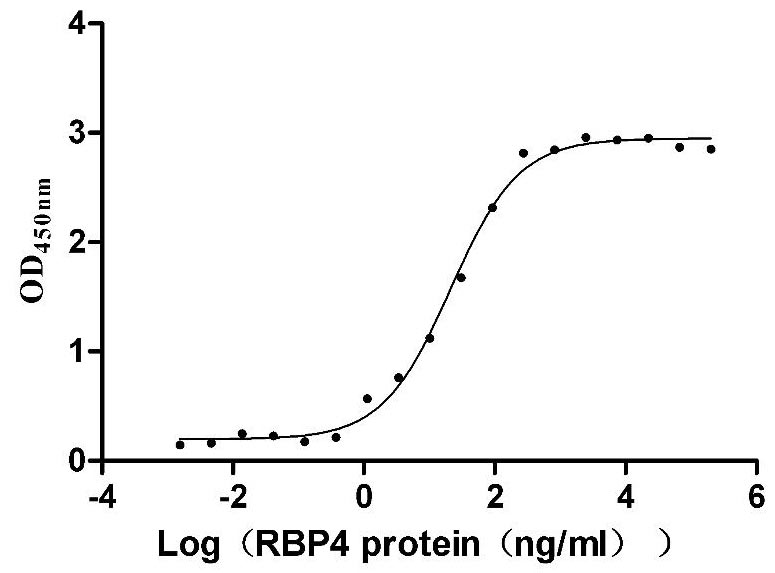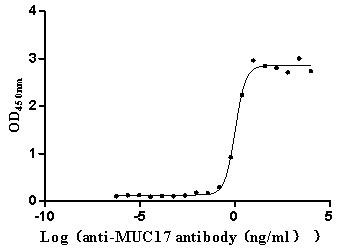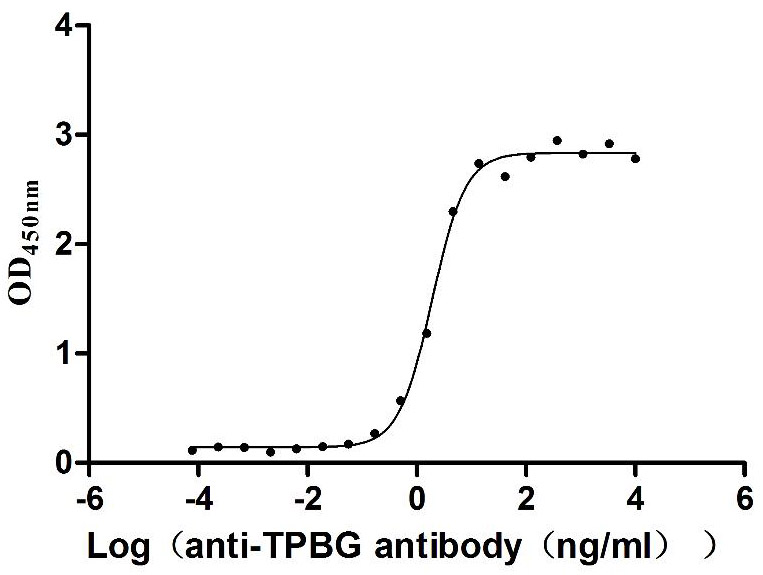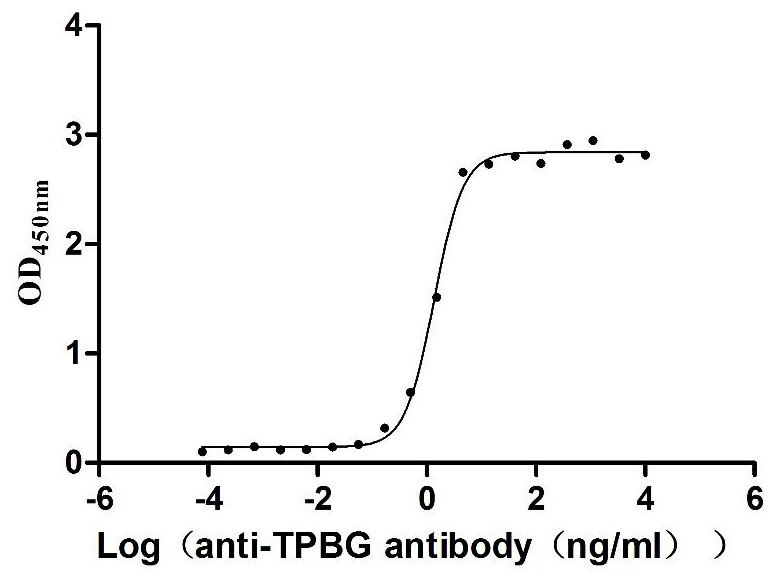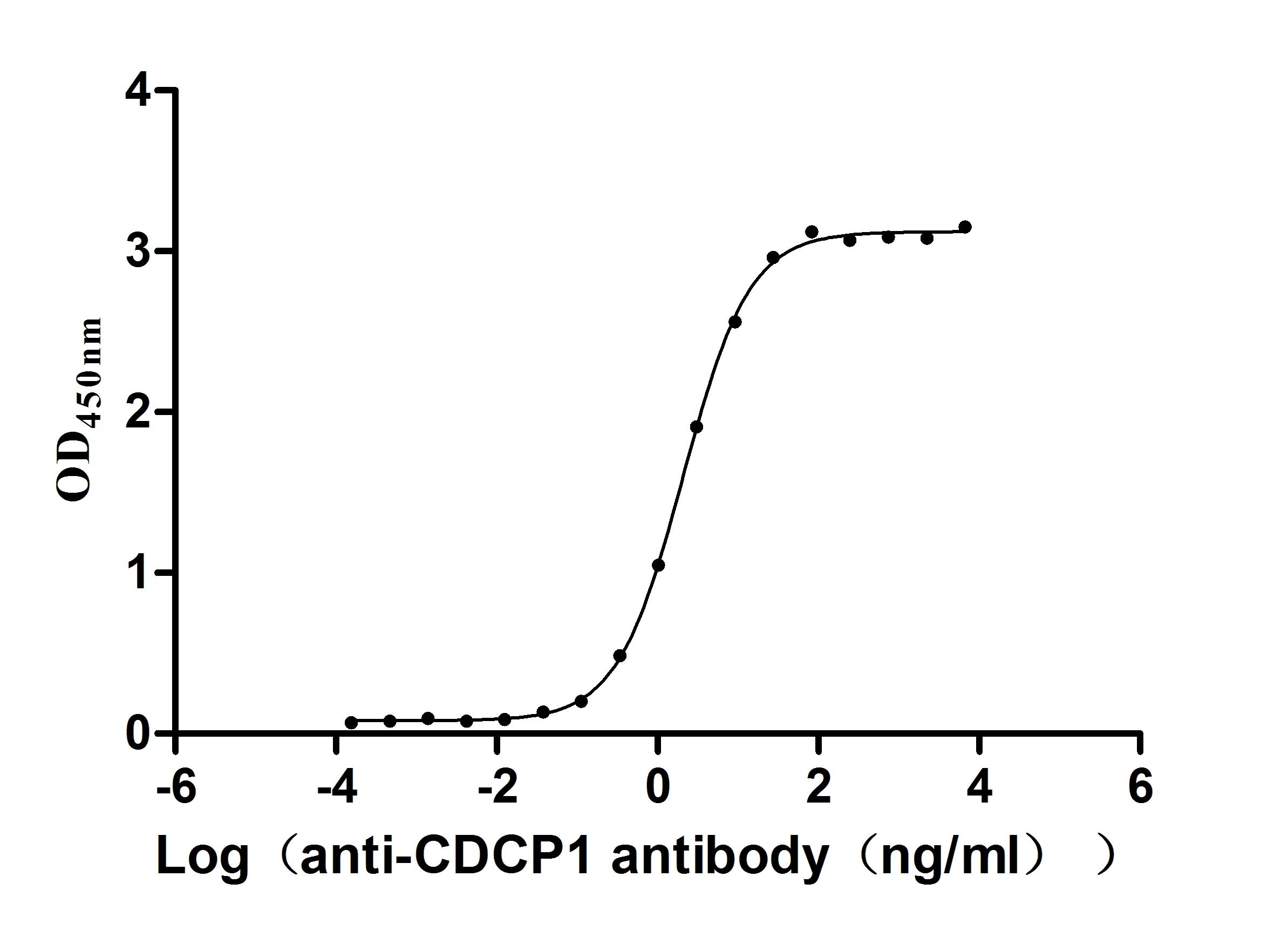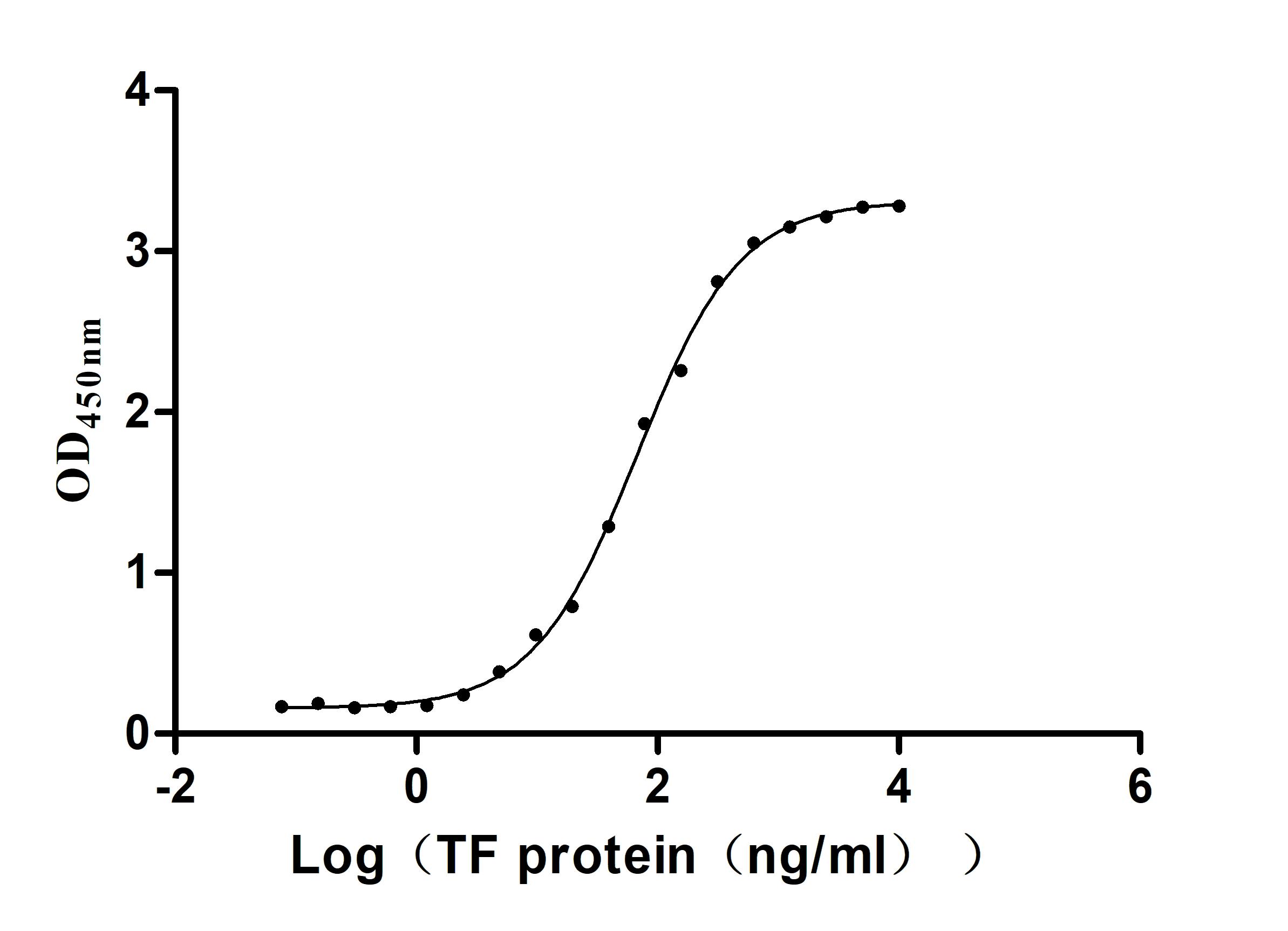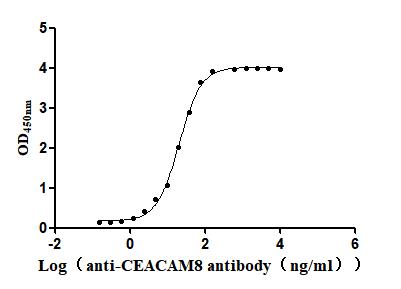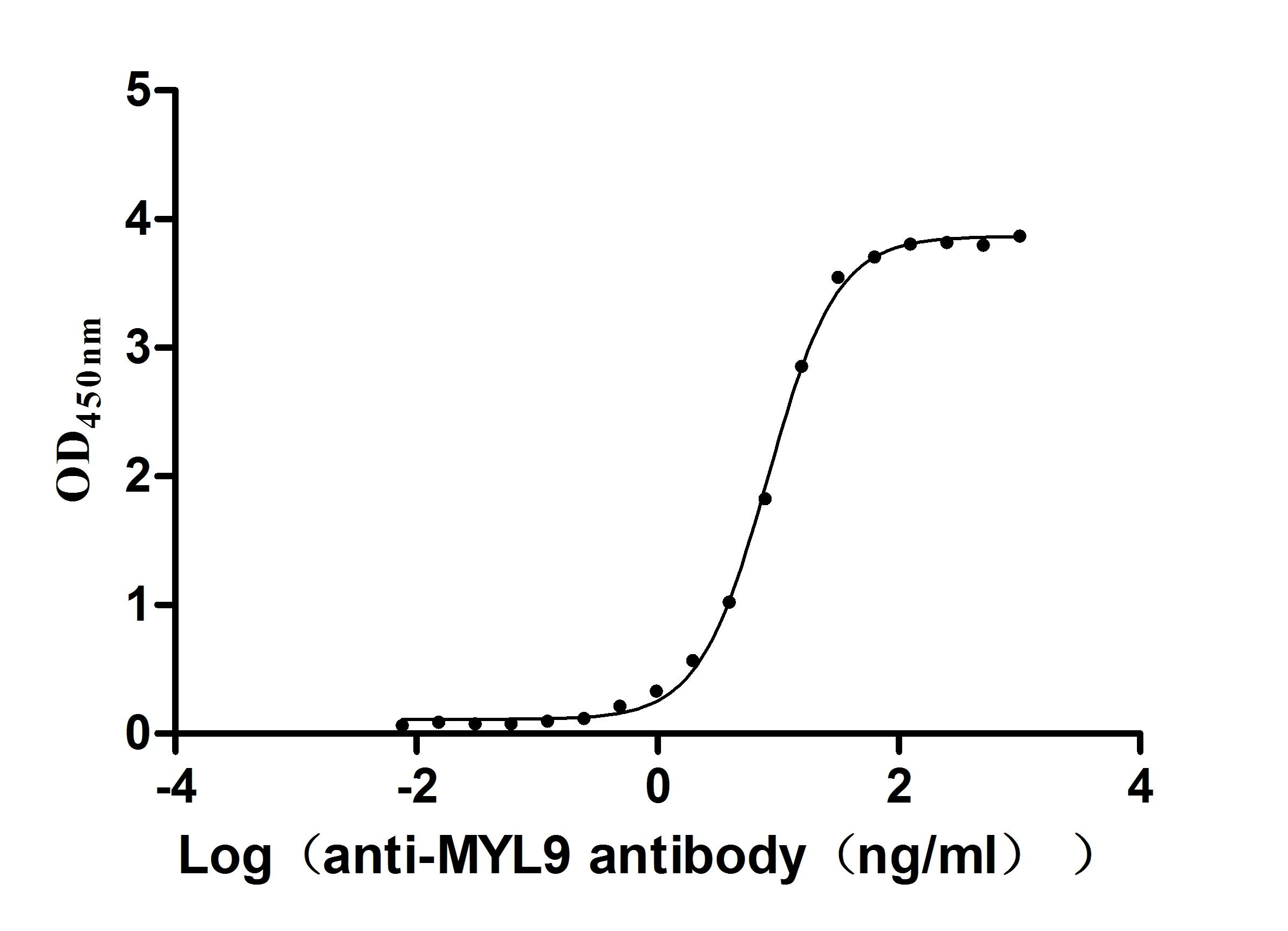Recombinant Human Hepatocyte growth factor-like protein (MST1), partial
-
中文名稱:人MST1重組蛋白
-
貨號:CSB-YP015055HU
-
規(guī)格:
-
來源:Yeast
-
其他:
-
中文名稱:人MST1重組蛋白
-
貨號:CSB-EP015055HU
-
規(guī)格:
-
來源:E.coli
-
其他:
-
中文名稱:人MST1重組蛋白
-
貨號:CSB-EP015055HU-B
-
規(guī)格:
-
來源:E.coli
-
共軛:Avi-tag Biotinylated
E. coli biotin ligase (BirA) is highly specific in covalently attaching biotin to the 15 amino acid AviTag peptide. This recombinant protein was biotinylated in vivo by AviTag-BirA technology, which method is BriA catalyzes amide linkage between the biotin and the specific lysine of the AviTag.
-
其他:
-
中文名稱:人MST1重組蛋白
-
貨號:CSB-BP015055HU
-
規(guī)格:
-
來源:Baculovirus
-
其他:
-
中文名稱:人MST1重組蛋白
-
貨號:CSB-MP015055HU
-
規(guī)格:
-
來源:Mammalian cell
-
其他:
產(chǎn)品詳情
-
純度:>85% (SDS-PAGE)
-
基因名:MST1
-
Uniprot No.:
-
別名:D3F15S2; DNF15S2; Hepatocyte growth factor like protein alpha chain; Hepatocyte growth factor like protein; Hepatocyte growth factor like protein beta chain; Hepatocyte growth factor like protein homolog; Hepatocyte growth factor-like protein beta chain; HGFL; HGFL_HUMAN; Macrophage stimulating 1 (hepatocyte growth factor like); Macrophage stimulatory protein; Macrophage-stimulating protein; MSP; MST1; NF15S2; OTTHUMP00000208927
-
種屬:Homo sapiens (Human)
-
蛋白長度:Partial
-
蛋白標簽:Tag?type?will?be?determined?during?the?manufacturing?process.
The tag type will be determined during production process. If you have specified tag type, please tell us and we will develop the specified tag preferentially. -
產(chǎn)品提供形式:Lyophilized powder
Note: We will preferentially ship the format that we have in stock, however, if you have any special requirement for the format, please remark your requirement when placing the order, we will prepare according to your demand. -
復(fù)溶:We recommend that this vial be briefly centrifuged prior to opening to bring the contents to the bottom. Please reconstitute protein in deionized sterile water to a concentration of 0.1-1.0 mg/mL.We recommend to add 5-50% of glycerol (final concentration) and aliquot for long-term storage at -20℃/-80℃. Our default final concentration of glycerol is 50%. Customers could use it as reference.
-
儲存條件:Store at -20°C/-80°C upon receipt, aliquoting is necessary for mutiple use. Avoid repeated freeze-thaw cycles.
-
保質(zhì)期:The shelf life is related to many factors, storage state, buffer ingredients, storage temperature and the stability of the protein itself.
Generally, the shelf life of liquid form is 6 months at -20°C/-80°C. The shelf life of lyophilized form is 12 months at -20°C/-80°C. -
貨期:Delivery time may differ from different purchasing way or location, please kindly consult your local distributors for specific delivery time.Note: All of our proteins are default shipped with normal blue ice packs, if you request to ship with dry ice, please communicate with us in advance and extra fees will be charged.
-
注意事項:Repeated freezing and thawing is not recommended. Store working aliquots at 4°C for up to one week.
-
Datasheet :Please contact us to get it.
相關(guān)產(chǎn)品
靶點詳情
-
基因功能參考文獻:
- Mst1 has an important role in inhibiting the growth of NSCLC in vitro and in vivo; its antiproliferative effect is associated with induction of apoptosis. PMID: 23928732
- These data suggest that MSP is an effective inhibitor of inflammation and lipid accumulation in the stressed liver, thereby indicating that MSP has a key regulatory role in non-alcoholic steatohepatitis. PMID: 27609031
- Identify MST1/MSP as a mitogen for tracheal basal cells. PMID: 25551685
- MSP appears to promote the migration of fibroblasts, enhances collagen synthesis and remodeling, and effectively improves wound healing. PMID: 25315688
- Elevated serum levels of MST1 were found in subjects with excessive alcohol use. PMID: 25704570
- These results support the hypothesis that the alpha-chain of MSPalphabeta mediates RON dimerization. PMID: 25193665
- functional consequences of the macrophage stimulating protein 689C inflammatory bowel disease risk allele PMID: 24409221
- Results suggest that the [AA] genotype of the common MST1 variant rs3197999 enhances genetic risk of sporadic extrahepatic cholangiocarcinoma irrespective of primary sclerosing cholangitis status. PMID: 23422030
- MSP may be one of the major determinants that affects the properties of tumor stroma and that produces a permissive microenvironment to promote cancer metastasis PMID: 23011677
- The present results refine the known genetic architecture in primary sclerosing cholangitis by confirming MST1 locus association. PMID: 22554193
- the missense SNP impairs MSP function by reducing its affinity to RON and perhaps through a secondary effect on in vivo concentration arising from reduced thermodynamic stability, resulting in down-regulation of the MSP/RON signaling pathway. PMID: 22087277
- HAT cleaves proMSP at the physiological activation site PMID: 22245154
- Studies indicate that the cylindromatosis/turban tumor syndrome gene (CYLD) ranked highest, followed by acylaminoacyl-peptidase (APEH), dystroglycan (DAG1), macrophage-stimulating protein (MST1) and ubiquitin-specific peptidase 4 (USP4). PMID: 21931648
- These findings suggest that the MSP/RON signaling pathway may be regulated by hepsin in tissue homeostasis and in disease pathologies, such as in cancer and immune disorders. PMID: 21875933
- considerable number of Merkel cell carcinoma cases expressed both RON and MSP, while Merkel cells do not express these molecules PMID: 21723047
- MSP-induced RSK2 activation is a critical determinant linking RON signaling to cellular EMT program. PMID: 21619683
- the oncogenic effect of BRAF(V600E) is associated with the inhibition of MST1 tumor suppressor pathways, and that the activity of RASSF1A-MST1-FoxO3 pathways determines the phenotypes of BRAF(V600E) tumors. PMID: 21249150
- results suggest that MSP induces uPAR expression via MAPK, AP-1 and NF-kappaB signaling pathways PMID: 21081472
- Observational study and genome-wide association study of gene-disease association, gene-environment interaction, and pharmacogenomic / toxicogenomic. (HuGE Navigator) PMID: 20014019
- These results suggest that activation of RON by macrophage-stimulating protein inhibits LPS-induced macrophage Cox-2 expression. PMID: 12177064
- Data show that macrophage stimulating protein (MSP) and its receptor (Ron) induce phosphorylation of both Ron and alpha6beta4 integrin, and result in activation of alpha3beta1 integrin. PMID: 12919677
- macrophage-stimulating protein-responsive cell growth in culture is suppressed by the ron-sema domain PMID: 14597639
- Macrophage stimulating protein and its receptor RON are involved in the pathophysiology of endometriosis. PMID: 15764806
- repression of MSP gene expression by mutant p53 may contribute to oncogenesis in a cell type-specific manner PMID: 16170349
- overexpression of MSP, MT-SP1, and MST1R was a strong independent indicator of both metastasis and death in human breast cancer PMID: 17456594
- Cell migration and production of inflammatory cytokines by the brain are enhanced by MSP stimulation in primary microglia. PMID: 18480548
- The five gene transcripts (aldolase B, elafin, MST-1, simNIPhom and SLC6A14) were changed in patients with ulcerative colitis, and were related to the disease activity. PMID: 18700007
- Gene-centric association mapping of chromosome 3p implicates MST1 in IBD pathogenesis. PMID: 19079170
- Results suggest that hepatocyte growth factor activator is a major serum activator of pro-macrophage-stimulating protein. PMID: 19456860
- The effect of BSN-MST1 locus on Crohn's disease predisposition was replicated, but no influence on ulcerative colitis or multiple sclerosis predisposition could be detected PMID: 19657358
顯示更多
收起更多
-
相關(guān)疾病:MST1 variant Cys-689 may be associated with inflammatory bowel disease (IBD), a chronic, relapsing inflammation of the gastrointestinal tract with a complex etiology. It is unsure whether Cys-689 itself or a variation in linkage disequilibrium with Cys-689 is responsible for the association with IBD.
-
亞細胞定位:Secreted.
-
蛋白家族:Peptidase S1 family, Plasminogen subfamily
-
數(shù)據(jù)庫鏈接:
Most popular with customers
-
Recombinant Mouse Transthyretin (Ttr) (Active)
Express system: Mammalian cell
Species: Mus musculus (Mouse)
-
Recombinant Human Mucin-17 (MUC17), partial (Active)
Express system: Mammalian cell
Species: Homo sapiens (Human)
-
Recombinant Macaca fascicularis Trophoblast glycoprotein (TPBG), partial (Active)
Express system: Mammalian cell
Species: Macaca fascicularis (Crab-eating macaque) (Cynomolgus monkey)
-
Recombinant Human Trophoblast glycoprotein (TPBG), partial (Active)
Express system: Mammalian cell
Species: Homo sapiens (Human)
-
Recombinant Macaca fascicularis CUB domain containing protein 1 (CDCP1), partial (Active)
Express system: Mammalian cell
Species: Macaca fascicularis (Crab-eating macaque) (Cynomolgus monkey)
-
Recombinant Human Serotransferrin(TF) (Active)
Express system: Mammalian cell
Species: Homo sapiens (Human)
-
Recombinant Human Carcinoembryonic antigen-related cell adhesion molecule 8(CEACAM8) (Active)
Express system: Mammalian cell
Species: Homo sapiens (Human)
-
Recombinant Human Myosin regulatory light chain 12B (MYL12B) (Active)
Express system: E.coli
Species: Homo sapiens (Human)


